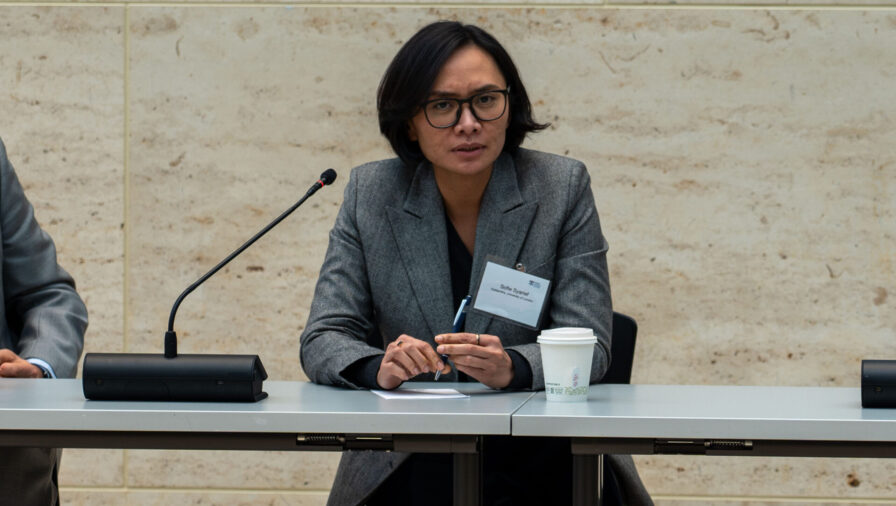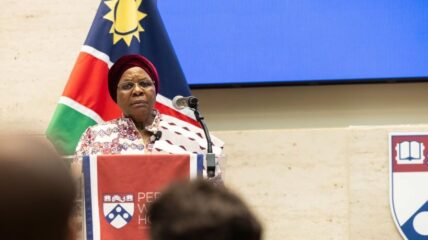The Media in Indonesia: Journalism Between the State and Oligarchs

Introduction
Within the past decade, Indonesia’s democracy has been in decline. While various factors are at play, this backsliding can be traced to former President Joko Widodo’s (2014-2024) administration, especially at the latter part of his first term (Mujani and Liddle, 2021), with the growing tendency for current President Prabowo Subianto—seen as the continuity of Widodo’s administration and policies (Arifianto and Priamarizki, 2024)—to perpetuate the trend. Widodo narrowed electoral space (Lay et al., 2017), increased oligarchic power (Tadjoeddin, 2019), and polarised religious conservatism (Bourchier, 2019). He also repressed voices of dissent, curtailed freedoms of speech and press (Syarief, 2024b), and intensified pro-government media coverage (Tapsell, 2017). Hence, as with the country’s overall democracy, Indonesia’s media quality is in decline.
In fairness, many new and established democracies around the world are suffering the same fate. However, Indonesia’s mainstream media landscape—from media ownership to journalistic practices—offers a lens through which to understand the broader power structure: a concentration of media power that is influenced by both political and corporate factors that affects journalism and public discourse. Rather than journalism for the public, what remains is journalism as a bargaining chip, commodity, and tool of control. This paper will assess how power has influenced Indonesian media and press over the past decade of democratic decline.
Media ownership
In the Indonesian media landscape, a select group of conglomerate owners are key players (see Table 1). They are Hary Tanoesoedibjo (Global Mediacom), Chairul Tanjung (CT Corp/Trans Corp), Aburizal Bakrie (Bakrie Group/Visi Media Asia), Surya Paloh (Media Group), Jakob Oetama-PK Ojong (Kompas Gramedia), Eddy Sariaatmadja (EMTEK), James Riady (Lippo/Berita Satu Media Holding), and Erick Thohir (Beyond Media). Some of these conglomerates are directly linked to political parties and, to varying degree, the administrations of former President Widodo and current President Subianto. Three of the owners are or had been political party leaders: Tanoesoedibjo founded and chairs Perindo Party (Partai Persatuan Indonesia/Indonesia’s Unity Party), Paloh founded and chairs Nasdem Party (Partai Nasdem/National Democrat Party), and Bakrie was the 2009-14 Golkar Party (Partai Golongan Karya/Functional Group Party) chairman, all of which have been in part of the political coalitions of both regimes. While Thohir has no formal political party affiliation, he actively campaigned for both presidents during their respective presidential bids.
What sets Indonesia’s oligarchic media apart from other countries is its competitive system, where moguls primarily use their media to advance personal interests, rather than forming a broader cartel (Mietzner, 2024). Indonesia’s media offers a diversity of news and perspectives, especially on politics and current events, driven by what sells and the agendas of owners. During the 2014 campaign, Paloh was a staunch supporter of Widodo, openly using his media companies to show his backing. When announcing his party’s support, he declared that all his media outlets would rally behind the candidate, stating, “(They all) must be fully utilized. The existing network will be used. If possible, (campaign) strikesfrom land, sea, and air.”
Table 1: Major Indonesia News Media Groups
| Owner | Corporation | Subsidiary | TV (main) | Print (main) | Online (main) | Radio (main) | Other | Political Leaning |
| Hary Tanoesoedibjo | Global Media Com | MNC | MNC, Global TV, RCTI, iNews | Koran Sindo | Okezone, Sindonews, iNews.id | Trijaya FM, ARH Global | IT, content production and distribution, talent management, automobile industry, banking, insurance, infrastructure. | * Chairman of Perindo Party (has yet to gain legislative seat). * Supporting both regimes but campaigned for opposition in 2014 & 2024 elections. * Daughter is the Vice-Minister of Tourism and Creative Economy. |
| Chairul Tanjung | CT Corp | Trans Corp | TransTV, Trans7, CNN Indonesia, CNBC Indonesia | – | Detik, CNNIndonesia.com, CNBCIndonesia.com | Hotel, F&B, banking, retail, theme parks, venture capital, insurance. | * No clear affiliation to political parties but supporting Widodo’s regime. * Was the Coordinating Economic Affairs Minister (May-October 2014) during former President Yudhoyono’s regime. * Daughter was one of Widodo’s “millennial” expert staff. | |
| Aburizal Bakrie | Bakrie Group | Visi Media Asia | TVOne, ANTV | – | Viva, TVOneNews.com | – | Telecommunications, property, metal, oil & gas, agribusiness, coal, infrastructure. | * Former chairman of Golkar Party (second largest political party). * Supporting both regimes but campaigned for opposition in 2014 election. |
| Surya Paloh | Media Group | Media Televisi Indonesia | MetroTV | Media Indonesia, Lampung Post | Metrotvnews | MG Radio | Hotels, property, catering, oil, coal. | * Former high rank official of Golkar Party (second largest political party), currently Chairman of Nasdem Party (fourth largest political party). * Supporting both regimes. |
| Jakob Oetama, & PK Ojong | Kompas Gramedia | KG Media | KompasTV | Kompas, Kontan, Warta Kota, Tribun | Kompas.com, Tribunnews, KompasTV.com, Kontas.co.id | Sonora, Smart FM, Motion | Hotels, PR agencies, event organizer, university, printing and publishing, bookshop chain, hotel chain, F&B. | Currently no clear political affiliation. |
| Edy Sariaatmadja | EMTEK | SCMA Group | SCTV, Indosiar, O Channel | – | Liputan 6, Merdeka, Kapanlagi | Elshinta | Property, home shopping, hospital, venture capital. | Currently no clear political affiliation. |
| James Riady | Lippo | Berita Satu | Berita Satu | Suara Pembaruan, Investor Daily | Beritasatu.com | – | Property, banking, education, insurance, shopping malls, retail, hospital, venture capital. | Currently no clear political affiliation. |
| Erick Thohir | Beyond Media | Mahaka Media | Jak TV | Republika | Republika.co.id, Jak-TV.co.id | Jak FM, Gen FM, Delta, Prambors | Content provider, advertising, event organizer, marketing company. | * Minister of SOEs for both regimes. * Widodo’s campaign chairman (2019), campaigned for Subianto (2024) |
Accordingly, during Widodo’s first term in office, there was a clear effort to co-opt media moguls, even through coercion, into his coalition (Tapsell, 2020). Paloh and Nasdem Party was awarded three ministerial positions; Tanoesoedibjo—initially hostile to the administration—shifted his media companies’ tone after being named suspect in a legal case; Bakrie’s—also initially hostile—chairmanship of the Golkar Party was undermined, leading to a new pro-Widodo chairman and milder stance against the government; and Tanjung’s daughter was offered an expert staff position in the presidential office. Other non-politically affiliated moguls chose to be less critical for the ease of doing business, even becoming a “polite watchdog” in the case of Kompas (part of Kompas Gramedia conglomerate), the most influential daily in the country (Wijayanto and Masduki, 2024). However, as there is an overlap of power between the two, defiance arose at times, such as when Paloh defied to support Widodo’s chosen successor, evident in the tone of his media outlets. This defiance was met with a targeted corruption investigation, resulting in one of Nasdem’s ministers being jailed and the vacant position being awarded to a non-party supporter.
This dynamic leads to two key consequences: 1) an increasing domination of elites with oligarchic power in the media that perpetually influence and are being influenced by the governing power, forming a tightly knit hegemony (Duile, 2021), and 2) the coverage and tone of the general mainstream media are largely favourable to, or less critical of, the government (Tapsell, 2017), further stifling the necessary public discourse on democracy.
Media company and leadership
Stifled public discourse became a real threat to law enforcement and citizen’s lives when elite power dynamics intersected with educated but timid journalists (Hanitzsch, 2005)—especially those in leadership positions with access to both elite and governing power—and the capitalistic nature of the media. Among many, two significant examples of this are the weakening of the KPK (Komisi Pemberantasan Korupsi/Corruption Eradication Commission) and the minimal pushback on COVID-19 pandemic handling.
KPK, once seen as a beacon of integrity and independence in a corrupt law enforcement system, was undermined by Widodo’s administration through the creation of misleading narratives portraying the commission as a superbody prone to abuse of power, alongside false allegations that many of its employees were radical Muslims similar to the Taliban. Through orchestrated social media propaganda (Hermawan, 2024), co-option of civil society (Mudhoffir, 2023), and repression of student protests (Mietzner, 2021), Widodo passed the 2019 KPK Law revision, which significantly reduced its powers and independence. Efforts to dismantle KPK were nothing new; there had been at least two orchestrated attacks against KPK in 2009 and 2012 (Butt, 2017). The difference was that previous attacks were mainly carried out by the national police, with the president, the public, civil society, and the media on KPK’s side.
While news of the law revision was plentiful in various mainstream media outlets, there was not much editorial support for KPK from the media. This was largely due to a series of informal campaigns targeting numerous newsroom elites, such as Forum Pemred (Forum Pemimpin Redaksi/Editor-in-Chief Forum—a gathering of editors of primarily nationwide mainstream media companies). As with media moguls, elite editors use the forum to exercise power dynamics with both governing and economic elites in order to gain access—for both editorial and personal interests—and advertisements. Through conversations with various members of the forum, the author notes a number of dinner invitations from public officials and politicians prior to the revision of the KPK Law, aimed at convincing the editors that KPK was indeed abusing its investigative powers and employing Muslim hardliners. While some of them were not entirely convinced, there was a tendency to treat the KPK issue with a neutral and cover-both-sides lens, leaving ample space for doubt—not against the government, but against KPK.
The minimal pushback on the COVID-19 pandemic handling was somewhat different. Mietzner (2022) extensively explained how Widodo’s administration controlled the pandemic narrative by leveraging his ties with media moguls and elites to produce news that avoided directly linking the high case and fatality numbers to government policy, while also downplaying the intimidation of critical news outlets and social media users by government allies. This led to a broadly favourable public perception of the government’s pandemic handling, despite the far more dire reality (Nugroho and Syarief, forthcoming).
However, another important aspect to this was the media’s business interest. There are no restrictions in Indonesia’s regulations that limit the government or political institutions to buy advertisement placements in media platforms. Six months into the pandemic, as corporate ads dwindled, the Minister of Finance, following a suggestion from the Indonesian Press Council, issued regulations directing all government ad budgets to mass media. As ministries regularly purchased airtime and slots, criticising the pandemic response became difficult. The author experienced this first-hand when a segment of the talkshow she hosted was sponsored by the Ministry of Health to discuss the national COVID-19 vaccination program. A written brief from the ministry outlined topics not to be addressed, including vaccine availability, priority areas, and pricing—while the government was still deciding whether to sell the vaccine or provide it for free. Management insisted that the author comply to avoid losing the ministry’s advertisements.
Journalism
Indonesia’s already compromised media landscape is further restricted by laws and regulations that curtail press freedom. Journalists and civil society organisations continue to challenge the problematic Information and Electronic Transaction Law (UU ITE), enacted in 2008, which allows legal action against perceived online defamation on any social media platform. This law has been used—often by public officials—to suppress freedoms of press and expression, leading to the detention of numerous journalists and activists. Additionally, other repressive regulations remain in place, such as the Communication and Informatics Ministerial Regulation 5/2021, which requires tech companies to remove content, including news, deemed unlawful or disruptive to public order. Furthermore, at least fifteen articles in the new Criminal Code, passed in early 2023, effectively criminalize routine journalistic work. Two draft revisions to existing laws, proposed by the previous Parliament controlled by the government’s coalition majority, aim to restrict investigative journalism and grant the police authority to block access to cyberspace. These bills could easily be revived by the new Parliament, as the majority remains under President Subianto’s control.
Meanwhile, news content is becoming increasingly homogeneous as the media’s capitalistic logic prioritises quantity over quality. Churnalism, sensationalism, clickbait, and the reduction of costly journalism, such as investigative reporting, have become the norm, all while journalists face growing job insecurity (Syarief, 2024a).
Conclusion
With such structure of power, the quest for Indonesia’s journalism to genuinely cater to public interests might be difficult to achieve in the near future. These dynamics are expected to persist, and may even worsen, now that President Subianto—whose authoritarian past is marred by allegations of human rights abuses and a low tolerance for criticism—has assumed power.



